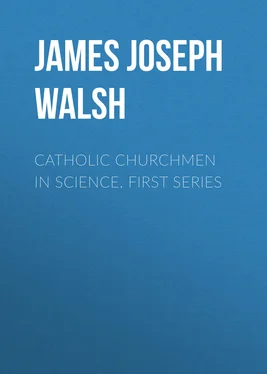James Walsh - Catholic Churchmen in Science. First Series
Здесь есть возможность читать онлайн «James Walsh - Catholic Churchmen in Science. First Series» — ознакомительный отрывок электронной книги совершенно бесплатно, а после прочтения отрывка купить полную версию. В некоторых случаях можно слушать аудио, скачать через торрент в формате fb2 и присутствует краткое содержание. Жанр: foreign_prose, foreign_religion, foreign_antique, на английском языке. Описание произведения, (предисловие) а так же отзывы посетителей доступны на портале библиотеки ЛибКат.
- Название:Catholic Churchmen in Science. First Series
- Автор:
- Жанр:
- Год:неизвестен
- ISBN:нет данных
- Рейтинг книги:4 / 5. Голосов: 1
-
Избранное:Добавить в избранное
- Отзывы:
-
Ваша оценка:
- 80
- 1
- 2
- 3
- 4
- 5
Catholic Churchmen in Science. First Series: краткое содержание, описание и аннотация
Предлагаем к чтению аннотацию, описание, краткое содержание или предисловие (зависит от того, что написал сам автор книги «Catholic Churchmen in Science. First Series»). Если вы не нашли необходимую информацию о книге — напишите в комментариях, мы постараемся отыскать её.
Catholic Churchmen in Science. First Series — читать онлайн ознакомительный отрывок
Ниже представлен текст книги, разбитый по страницам. Система сохранения места последней прочитанной страницы, позволяет с удобством читать онлайн бесплатно книгу «Catholic Churchmen in Science. First Series», без необходимости каждый раз заново искать на чём Вы остановились. Поставьте закладку, и сможете в любой момент перейти на страницу, на которой закончили чтение.
Интервал:
Закладка:
It is now nearly five years since Father Adolph Muller, S.J., professor of Astronomy in the Pontifical Gregorian University of Rome, and director of a private observatory on the Janiculum in that city, wrote his historical scientific study 2 2 Nikolaus Kopernicus, Der Altmeister der neueren Astronomie, Ein Lebens und Kultur Bild . Von Adolf Muller, S.J.
of the great founder of modern astronomy. The book has been reviewed, criticized and discussed very thoroughly since then, and has been translated into several languages. The latest translation was into Italian, the work of Father Pietro Mezzetti, S.J.,* 3 3 Professor of Astronomy and Physics at the Pontifical Leonine College of Anagni
and was published in Rome at the end of 1902–having had the benefit of the author's revision. The historical details, then, of Copernicus's life may be considered to have been cast into definite shape, and his career may be appreciated with confidence as to the absolute accuracy and essential significance of all its features.
Nicholas Copernicus–to give him the Latin and more usual form of his name–was the youngest of four children of Niclas Copernigk, who removed from Cracow in Poland to Thorn in East Prussia (though then a city of Poland), where he married Barbara Watzelrode, a daughter of one of the oldest and wealthiest families of the province. His mother's brother, after having been a canon for many years in the cathedral of Frauenburg, was elected Bishop of the Province of Ermland. The future astronomer was born in 1473, at a time when Thorn, after having been for over two hundred years under the rule of the Teutonic Knights, had for some seven years been under the dominion of the King of Poland. There were two boys and two girls in the family; and their fervent Catholicity can be judged from the fact that all of them, parents and children, were inscribed among the members of the Third Order of St. Dominic. Barbara, the older sister, became a religious in the Cistercian Convent of Kulm, of which her aunt Catherine was abbess, and of which later on she herself became abbess. Andrew, the oldest son, became a priest; and Nicholas, the subject of this sketch, at least assumed, as we shall see, all the obligations of the ecclesiastical life, though it is not certain that he received the major religious orders.
Copernicus's collegiate education was obtained at the University of Cracow, at that time one of the most important seats of learning in Europe. The five-hundredth anniversary of the founding of this University was celebrated with great pomp only a few years ago. Its origin, however, dates back to the times of Casimir the Great, at the end of the thirteenth or the beginning of the fourteenth century. Its foundation was due to the same spirit of enthusiastic devotion to letters that gave us all the other great universities of the thirteenth century. The original institution was so much improved by Jagello, King of Poland, at the beginning of the fifteenth century, that it bears his name and is known as the Jagellonian University. It was very natural for Copernicus to go back to his father's native city for his education; but his ambitious spirit was not content with the opportunities afforded there. He does not seem to have taken his academic degrees, and the tradition that he received his doctorate in medicine at the University of Cracow cannot be substantiated by any documentary evidence.
At Cracow, Copernicus devoted himself mainly to classical studies, though his interest in astronomy seems to have been awakened there. In fact, it is said that his desire to be able to read Ptolemy's astronomy in the original Greek, and to obtain a good copy of it, led him to look to Italy for his further education. During his years at Cracow, however, he seems to have made numerous observations in astronomy, as most of the astronomical data in his books are found reduced to the meridian of Cracow. The observatory of Frauenburg, at which his work in astronomy in later life was carried on, was on the same meridian; so that it is difficult to say, as have some of his biographers, that, since Cracow was the capital of his native country, motives of patriotism influenced him to continue his observations according to this same meridian. Copernicus was anxious, no doubt, to come in contact with some of the great astronomers at the universities of Italy, whom he knew by reputation and whose work was attracting attention all over Europe at that time.
How faithfully Copernicus applied himself to his classical studies can be best appreciated from some Latin poems written by him during his student days. These poems are an index, too, of the personal character of the man, and give some interesting hints of the religious side of his character. Altogether there are seven Latin odes, each ode composed of seven strophes. The seven odes are united by a certain community of interest or succession of subjects. All of them refer to the history of the Redeemer either in types or in reality. In the first one the prophets prefigure the appearance of the Saviour; in the second the patriarchs sigh for His coming; the third depicts the scene of the Nativity in the Cave of Bethlehem; the fourth is concerned with the Circumcision and the imposition of the Name chosen by the Holy Ghost; the fifth treats of the Star and the Magi and their guidance to the Manger; the sixth concerns the presentation in the Temple; and the seventh, the scene in which Jesus at the age of twelve disputes with the doctors in the Temple at Jerusalem.
Copernicus's recent biographers have called attention particularly to the poetical beauties with which he surrounds every mention of the Blessed Virgin and her qualities. As is evident even from our brief resume of the subjects of the odes, the themes selected are just those in which the special devotion of the writer to the Mother of the Saviour could be very well brought out. There are, besides, a number of astronomical allusions which stamp the poems as the work of Copernicus, and which have been sufficient to defend their authenticity against the attacks made by certain critics, who tried to point out how different was the style from that of Copernicus's later years in his scientific writings. The tradition of authorship is, however, too well established on other grounds to be disturbed by criticism of this sort. The poems were dedicated to the Pope. In writing poetry Copernicus was only doing what Tycho Brahe and Kepler, his great successors in astronomy, did after him; and the argument with regard to the difference of style in the two kinds of writings would hold also as regards these authors.
Copernicus's years as a boy and man–that is, up to the age of thirty-five–corresponded with a time of great intellectual activity in Europe. This fact is not as generally recognized as it should be, for intellectual activity is supposed to have awakened after the so-called Reformation. During the years from 1472 to 1506, however, there were founded in Germany alone no less than six universities: those of Ingolstadt, Treves, Tubingen, Mentz, Wittenberg, and Frankfort-on-the-Oder. These were not by any means the first great institutions of learning that arose in Germany. The universities of Prague and Vienna were more than a century old, and, with Heidelberg, Cologne, Erfurt, Leipsic, and Rostock, besides Greifswald and Freiburg, founded about the middle of the fifteenth century, had reached a high state of development, and contained larger numbers of students, with few exceptions, than these same institutions have ever had down to our own day. In most cases their charters were derived from the pope; and most of the universities were actually recognized as ecclesiastical institutions, in the sense that their officials held ecclesiastical authority.
At this time–the end of the fifteenth and the beginning of the sixteenth century–it was not unusual for students, in their enthusiasm for learning, to attempt to exhaust nearly the whole round of university studies. Medicine seems to have been a favorite subject with scholars who were widely interested in knowledge for its own sake. Almost at the same time that Copernicus was studying in Italy, the distinguished English Greek scholar, Linacre, was also engaged in what would now be called post-graduate work at various Italian universities, and in the household of Lorenzo the Magnificent at Florence, with whose son–so much did Lorenzo think of him–he was allowed to study Greek. Linacre (as will be seen more at length in the sketch of his life in this volume), besides being the greatest Greek scholar of his time, the friend later of More and Colet and Erasmus in London, was also the greatest physician in England.
Читать дальшеИнтервал:
Закладка:
Похожие книги на «Catholic Churchmen in Science. First Series»
Представляем Вашему вниманию похожие книги на «Catholic Churchmen in Science. First Series» списком для выбора. Мы отобрали схожую по названию и смыслу литературу в надежде предоставить читателям больше вариантов отыскать новые, интересные, ещё непрочитанные произведения.
Обсуждение, отзывы о книге «Catholic Churchmen in Science. First Series» и просто собственные мнения читателей. Оставьте ваши комментарии, напишите, что Вы думаете о произведении, его смысле или главных героях. Укажите что конкретно понравилось, а что нет, и почему Вы так считаете.












